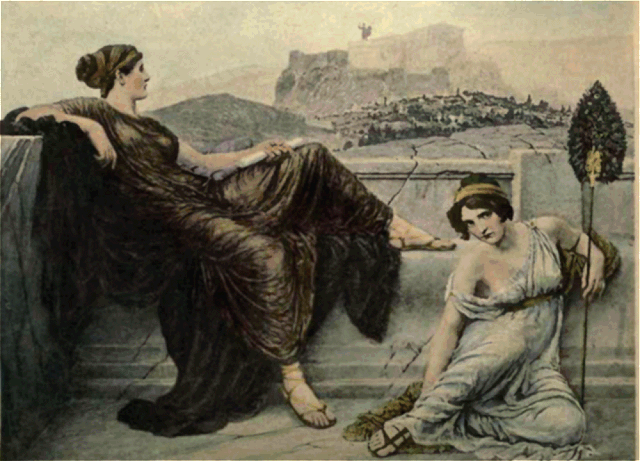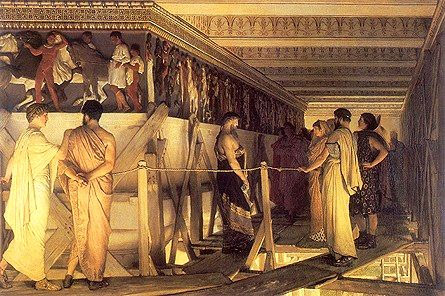Aspasia (470 BC- 400 BC) was born in Miletus and she became famous for her relationship with the prominent politician Pericles.Only a few things are known about her. She spent most of her life in Athens and it is said that by influencing Pericles she was affecting Athenian politics too.Authors like Plato Aristophanes and Ksenophon mention her name in their works.
Some of those authors argue that she was an owner of a brothel while she herself was also a prostitute.However contemporary historians are sceptical over these allegations.Considering that many of these authors were writting comedies or satirical stories maybe their intentions were to defame Pericles.Some historians proceed furthermore believing that Aspasia wasn't even an hetaira and that she was just married with Pericles.
Aspasia delivered a son by Pericles whom she named also Pericles. Her son became a general of the Athenian army and was eventually executed after a defeat in a navel battle.After the death of Pericles the elder Apasia became hetaira of Lysicles, another prominent statesman of Athens.
 |
| Marie Bouliard poses as Aspasia in 1794, |
Her birthplace was Miletos which nowadays is located in the Aidin district of Turkey. Her father's name was Aksiochos. She was descended from a wealthy family which was apparent by the education she had received.
It's unknown under what circumstances she travelled to Athens. The discovery of a gravestone with the names Aksiochos and Aspasios lead the historian Peter k. Bicknell to reconstruct the family enviroment and its possible relations with Athens. His theory connects Alcibiades of Skambonids who was exiled from Athens in 460 BC and maybe he spent his years in exile in Miletus. Bicknell assumes that Alcibiades married Aksiochos' daughter while he was in Miletos. Eventually Alcibiades returned back to Athens with his new wife and her little sister who is believed to be Aspasia.Bicknell argues that the offspring of this wedding was named Aksiochos(the uncle of the notorious Alcibiades of the Peloponnesian war). He also assumes that Pericles got in touch with Aspasia because of his friendly relations with the house of Alcibiades.
According to controversial references of ancient authors and some contemporary researchers Aspasia became an owner of a brothel and he herself was also an hetaira(a kind of athenian prostitution). Hetairai were professional women who were entertaining men of high class. Some of them were also prostitutes. Except from their beauty that made them distinct from other Athenian women they were also educated(often at high level like Aspasia) independent and they were paying taxes. The hetairai institution was the only sample of woman independence in the ancient times and Aspasia was the obvious example of it.According to Plutarchus Aspasia was compared to Thargilia who was also a fmous hetaira from Ionia.
 |
| Aspasia Painting by Henry holiday |
Being a foreign citizen(non Athenian) and maybe a hetaira relieved Aspasia from any legal constraints which traditionally kept every Athenian woman inside her oikos(house). She became a lover of Pericles at the begining of the 440's BC. After Pericles divorced his first wife he started living together with Aspasia but it is uncertain if he married her or not.In 440 BC Aspasia delivered a boy which she called Pericles. She must have been at a very young age at this time cause she gave birth to a Lysicles' child in 428 BC.
At the Athenian society Aspasia was mostly known for her eloquence and her accurate consultations rather than her physical appearance.According to Plutarch her house became a center of culture in Athens and attracted daily many authors and Philosophers , among them the philosopher Socrates .Plutarch mentions that even though she had an immoral life the Athenians were bringing their wives with them to Aspasia's house in order to listen her speeches.
Pericles and Aspasia were attacked and defamed a lot of times.We should not forget that Athens was a democracy and not a monarchy therefore anyone could say anything about everyone regardless of their social status. Aspasia's relation with Pericles and her involvement in Athenian politics annoyed many people.
Donald Kagan a historian of the Yale university states that Aspasia was not at all popular during the Samian war.In 440 BC Samos was in war with Miletos and Priini. When they lost the war the Milesians sent an envoy to Athens to plead for an Athenian intervention. When the Athenians ordered a ceasefire and asked for controlling the negotiations the Samians refused and as a result Pericles implemented an act of campaigning against Samos. According to Plutarch, there was a rumour that Aspasia who was born in Miletos influenced Pericles on taking this decision even though he didn't want a war with Samos.
 |
| Socrates seeks Alcibiades in Aspasia's house. Painting Gean Leon Gerome(1861) |
Before the begining of the Peloponnesian war(431-404) Pericles and Aspasia were legally and personally attacked. Aspasia was charged that she was seducing little girls in order to satisfy the perverted needs of Pericles.According to Plutarch she was condemned for being disrespectful by the comic poet Ermippus who was the public prosecutor of this trial. Eventually Aspasia was found innocent because the accusations had no evidence.
In the theatrical comedy Acharnes the famous comedian Aristophanes accuses Aspasia for inciting the Peloponnesian war.He argues that the law about Megara that was implemented by Pericles with which Megara would be forbidden to trade with Athens and its allies was an act of revenge of Aspasia because some Megareans had abducted some prostitutes from her brothel.The accusations for the Peloponnesian war were mainly mirrored by the accusations about the Samian war. Even Ksanthippos who was Pericles' son from his first marriage was accusing Pericles and Aspasia.
Final years and death
In 429 BC Athens was tormented by a plague and Pericles saw many of his relatives and among them his two sons from his first marriage Ksanthippos and Paralos die from it.With his morale decrease he fell into depression and not even Aspasia's companionship was able to consolate him.A little before Pericle's death the Athenians implemented a law about the Athenian citizenship which could permit his son Pericles who was half Athenian to have full political rights and become his heir.It's weird though that Pericles had implemented a law by which only persons with two indigenous parents could have full political rights.Pericles died in 429 BC hit by the plague.
After Pericles' death Aspasia lived with Lysicles with whom she had a son.However Lysicles died in 428 BC and there's where the contemporary accounts about Aspasia stop. It is considered that she died near 400 BC cause the historians argue that she died before Socrates who died in 399 BC. Some historians think that her death must have been painful that's why no contemporary author mentions it.
Aspasia was rumoured to be behind of many activities of Pericles. This shows how influential and important personality she was for the Athenian society. Some authors say that she taught Pericles rhetoric and that she prepared some of his famous speeches.Socrates was an admirer of Aspasia and that was proved by some of his advice to people were he is quoting Aspasia and his consultations to people to go and seek advice from her.As an ancient figure it is not unjust that she became equal in fame with the female poet Sappho.
 |
| Oil painting by Sir Lawrence Alma-Tadema (1868). |
source: ellinikoarxeio.com translation of the text made by me.


No comments:
Post a Comment